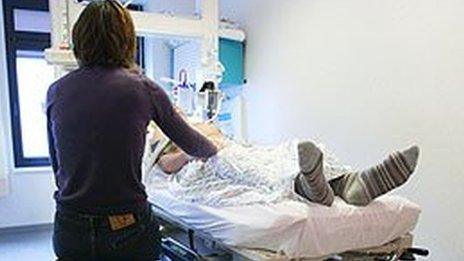Jeremy Hunt welcomes 'seven-day NHS' plan
- Published
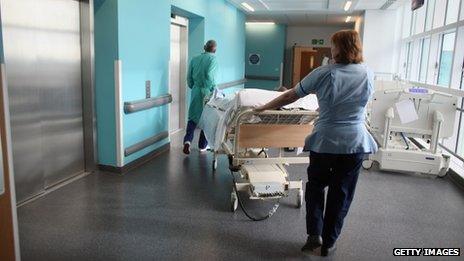
Last year a study found patients were 16% more likely to die if they were admitted on a Sunday than mid-week
Plans to improve care for patients in hospitals in England at weekends have been commended by Health Secretary Jeremy Hunt.
NHS medical director Professor Sir Bruce Keogh is expected to announce an increase in the number of senior doctors working weekends.
It comes after a year-long inquiry into NHS care following concerns over higher death rates on Saturdays and Sundays.
Labour said the government must set out clearly how the plan would be paid for.
Sir Bruce is expected to outline the plans on Sunday.
In a Sunday Times, external interview, he warns hospitals that they could face multimillion-pound penalties if they fail to keep up their standards at weekends.
X-ray, ultrasound, CT and MRI scans will be carried out as promptly at the weekend as during the week, the paper reports.
Sir Bruce also proposes to stop the practice of care being provided at weekends without consultants being present - hospitals that refuse could face losing their right to use junior doctors.
He tells the paper: "Historically at the weekend our service has been delivered largely by junior doctors in training and now we are changing that."
Meanwhile, a group of senior consultants have called for proper staffing of NHS wards at weekends in a letter published in the Daily Telegraph., external
'Once in a generation opportunity'
Last year a study by the Royal Society of Medicine found patients were 16% more likely to die if they were admitted on a Sunday than mid-week. The research looked at both emergency and planned admissions.
Mr Hunt said: "Patients should be able to depend on the NHS every day - not just Monday to Friday.
"I want the NHS to expand to provide seven-day services so that more patients get the best care when they need it.
"It is great news that Sir Bruce Keogh will shortly be setting out his plans for the NHS to provide seven-day services."
Dean Royles, chief executive of the NHS Employers organisation, said: "Seven-day working is probably the most important issue facing the NHS at the current time, and movement in this direction is essential if we are to ensure its sustainable long-term future.
"The NHS can't afford to sit back and rest on the laurels of its 65-year history. We are increasingly seeing hospitals and community-based health services develop innovative services that anticipate and respond to patient needs, but all too often NHS employers find the terms and conditions of doctors are getting in the way of progress.
"We are now facing a once-in-a-generation opportunity to change how the NHS works. Patients, employers, medical royal colleges and the government all want to see seven-day care."
Andy Burnham, shadow health secretary, said the idea was "right in principle" but called for more detail about how it would be paid for.
"It would not be progress if it is achieved by closing smaller A&Es or raiding other services, such as community or mental health services. This would take the NHS in the wrong direction - forcing even more people into hospital, when the future demands more care in the home," he said.
He said the government should "urgently stop the cuts to front-line staffing".
"Things will not get better unless the government first stops the rot," he added.
NHS England declined to comment on the review ahead of its publication.
'Catastrophic' care
Meanwhile, in the open letter published in the Telegraph, eight surgeons raised concerns that patients were being put at risk because inexperienced hospital staff were being forced to take on too much responsibility.
It follows the treatment given to one of the consultants, retired surgeon Russell Hopkins, whose after-care following a hip operation in June 2011 failed him "catastrophically", the surgeons wrote.
Mr Hopkins, a former British Medical Association Wales chairman, was left with nerve and bladder damage after being left for days without seeing a consultant as his condition worsened, the newspaper reported., external
They said surgery was "too large and technical for a shift system of junior staff".
In the letter, the consultants called for a return to the system that pre-dated the "working time directive", which limits surgeons' hours, with doctors organised into firms.
"Many surgeons yearn to put ethics before directives and to practise these old-fashioned, fundamental values," they wrote.
Health boards and council social services in Wales have produced joint plans for the first time this year to manage winter pressures, while officials do not rule out seven day working as part of an overhaul.
Dr Grant Robinson, the Welsh government's clinical lead for unscheduled care, said radical changes were needed to the system: "Sometimes there are some big game changers - seven day working is a radical change that as the potential to help."
Last month doctors in Scotland said senior hospital medics should be available round the clock. It followed a call by Scotland's health secretary for more to be done to make sure the NHS provided the same service at weekends as it did during the week.
Alex Neil said five health boards would pilot new approaches in a £4m trial. He has also committed to having consultants in wards seven days a week.
- Published14 December 2013
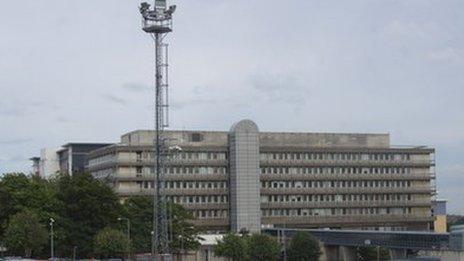
- Published16 July 2013
- Published16 July 2013
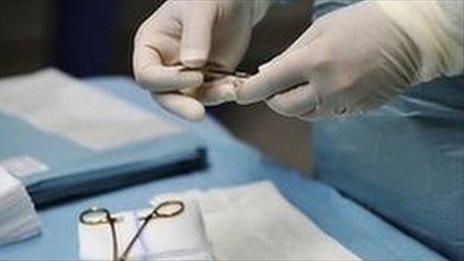
- Published16 December 2012
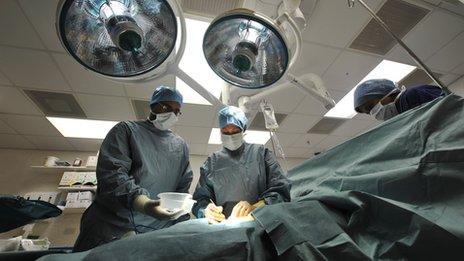
- Published3 February 2012
